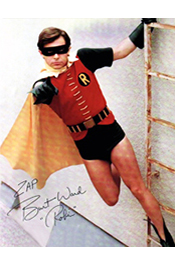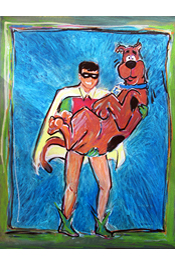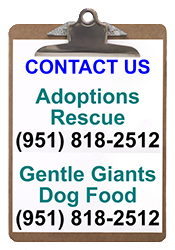|

|  | Mon, November 28, 2005 |
|
Batman's sidekick now saving the day for Great Danes
He made sense of the Riddler's brainteasers, de-clawed Catwoman and cracked Egghead into an omelet -- Bang! Zoom! Today, the former Boy Wonder is putting the kibosh on the senseless killing of his favorite dog breed, the Great Dane.
Best known for his portrayal of Robin, the super hero's sidekick on the TV version of "Batman" (1966-1968), Burt Ward is still in show business, but he and his wife, Tracy, now devote much of their time to Great Dane Rescue.
They have adopted more than 3,000 Great Danes over the years, and currently share their California home with 50 dogs (including 10 puppies).
Ward doesn't mind talking about his "Batman" role. He's polite as he answers questions he's been asked many times. Yes, it's true, Frank Sinatra accepted the role of The Joker, but just after Cesar Romero had signed for the part. Ward doesn't have a favorite guest star, but says, "It was so cool working with people I grew up watching in the movies, like Vincent Price (Egghead) and George Raft and Tallulah Bankhead."
When the subject turns to Great Dane rescue, however, Ward sounds totally like Robin. His voice rises and you just wait for him to holler, "Holy, Save the Dogs!"
"When my wife, daughter and I moved to Riverside County (Calif.), we thought about getting a dog -- a big dog to fill a big house," says Ward, talking by phone from his car (a cell phone, not the bat phone).
Tracy and Burt met in 1989. Tracy flew to Los Angeles to determine if her company should acquire Burt's company (Tracy was a top exec at her late dad's firm, known for corporate raids). Instead, she acquired a husband. At that time, Tracy had a teacup poodle and two cats.
"Even then, we knew not to support pet shops because that's like supporting puppy mills. We wanted to rescue a dog." That's exactly what they wound up doing. Their first Great Dane, named Beauty, had been abandoned in a back yard. One neighbor fed it scraps so it could survive, but another neighbor threw bottles at the pet. Beauty was scheduled to be euthanized at a local shelter when the Wards intervened.
It wasn't long before Tracy and Burt rescued a second Great Dane. Just as the Caped Crusaders used to do, they showed up at last minute to save the day.
Later, Tracy heard about 40 other Danes available for rescue. "I somehow figured those dogs were safe because they weren't abandoned yet," she recalls. Tracy received a life-altering jolt when she learned all the dogs had been destroyed. "I still get goose bumps when I talk about it," she says. "That experience changed my life. I knew I had to do something."
In 1995, the Wards began to do more than a little something, rescuing any Great Danes they could get their paws on. They also accepted mastiffs and other giant breeds, and deaf dalmatians, creating Great Dane Adoptions and Rescue, which was recently changed to a foundation called Gentle Giants Rescue and Adoptions, Inc.
On rescue organizations that euthanize deaf dalmatians or Great Danes rather than adopt them out, Tracy is adamant. "These dogs are not defective. The hearing-impaired dogs live with us, and with our cats and birds -- and they're more than perfect in some ways. They pay attention to their people. They're easy to train with hand signals, I even teach them to lip read. Whenever I use a hand signal, I say the command. They actually do what I say -- even if they can't hear. Of course, you want leashes on them -- but then, you should have a leash on all dogs unless they're in a secure area."
Despite being diagnosed as deaf, her Harlequin Great Danes actually do hear low tones and some novel sounds, says Tracy. "I can tell you they all recognize the ice cream truck."
Tracy says there are many misconceptions about Great Danes. "Don't believe everything you read."
For example, she claims that if these dogs are altered, they typically live far longer than the eight to 10 years suggested in many books. She maintains that Danes can easily live to 14 and often make it to 18 years.
She also says that bloat -- a potentially life-threatening twisting or torsion of the stomach caused by a build up of gas, most prevalent in deep-chested dogs like Great Danes -- should never happen. "The secret is feeding them five times a day or more."
Burt says as Americans live increasingly in urban settings, particularly apartments and condos, the Great Dane is actually a perfect match. "They're couch potatoes, they don't require a lot of exercise," he says. "They're better dogs for apartments than a little terrier, who, let's face it -- is yappy. Great Danes are very deliberate."
Unfortunately, too many apartment and condo managers don't give Danes a chance, with rules about pets not exceeding an arbitrary weight limit of, for example, 25 or 30 pounds. "This is about ignorance and an example of imperfect people making imperfect rules," says Burt. "In fact, Great Danes are perfect for apartments and condos."
Burt also notes that "Great Danes are incredibly sensitive. They're crushed when they're given up by people. They really do feel sad; dogs have feelings, too."
Despite their success at adopting Danes, the Wards are very picky about who can adopt the dogs they rescue. For example, a contract obligates adoptees to keep their dogs indoors. Tracy says, "These are house dogs, not yard dogs. They have a single coat of hair with the insulation of a Chihuahua. They overheat in the sun; when exposed too much, they get skin cancer. They're also highly sensitive to the cold."
Life in Southern California isn't bad, even for dogs waiting to be adopted. Great Danes and other dogs roam freely around the Wards' 5-acre grounds. They can lounge by the pool (though the couple make sure the dogs don't spend too much time in the sun), enjoy life in one of two sprawling, air-conditioned/heated dog houses, or pass through giant doggy doors to enter the Ward's 4,000-square-foot home. Sometimes bathroom sinks become water bowls. After all, these are Great Danes.
Tracy says the only household hazard is stepping on a dog if you need to get up in the middle of the night. "Sure, why, of course, our bedroom is their bedroom."
When he's not saving Great Danes, Burt runs Boy Wonder Visual Effects, creating dazzling special effects for movies. However, his primary investment is in dogs.
"If you invest love, you'll get it back double-fold," Burt says. "Unfortunately, you can't say the same for people."
By Steve Dale
Guest Columnist
|
 © 2006 All rights reserved. © 2006 All rights reserved.
A division of Sun Coast Media Group Inc.
Publishers of the Sun newspapers. |
|















